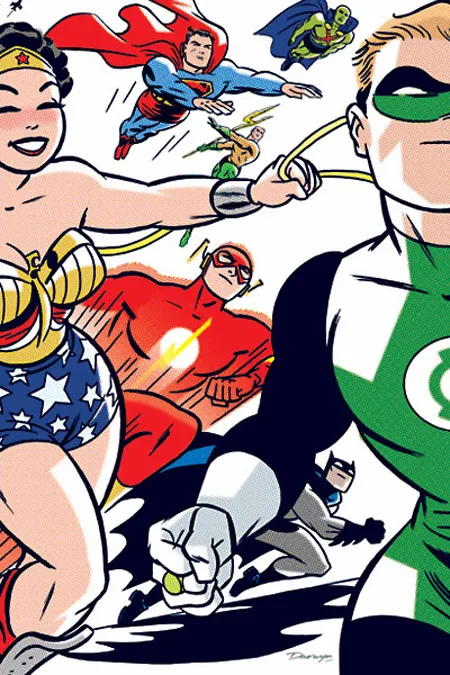There are interesting comparisons to be made, reading Darwyn Cooke's DC: The New Frontier in conjunction with the classic Watchmen. Deceptively, both begin with similar premises: as an older generation of superheroes retire (in part, in both cases, to McCarthy-era politics), a new generation steps in to take its place. Yet, whereas in Watchmen (filtered through 1980s cynicism), we see the new heroes nearly implode under the weight of their own neuroses, the heroes of New Frontier (filtered throught twenty-first century optimism) put aside their ideological differences in the interest of heroism above all.
As I mentioned before, in the introduction to Greg Cox's Infinite Crisis novel, Mark Waid cites specifically misunderstandings of Watchmen that inspired the "grim and gritty" era tha necessitated Infinite Crisis and the new One Year Later era of DC Comics. Though Cooke claims in his afterword to the Absolute DC: New Frontier hardcover that he wants to avoid parallels between New Frontier and the state of the comics industry, he does mention specifically that his ideal Justice League does not succumb to "envy, greed, or jealousy." We can take this further to interpret that Cooke's Hal Jordan is fairly unlikely to kill all the Corps and become a time-bending despot.
Which is to say, DC: The New Frontier, though reportedly concieved before Infinite Crisis, has at its core a distinctly Geoff Johnsian outlook. And let's not ignore Cooke's all-too-familiar splash-page of Superman punching Batman a la The Dark Knight Returns, which Cooke turns on its head later when we learn that the two heroes, best of friends, staged the fight as a ruse. Cooke comments on the 1940s, '50s, and 60s here, but the 1980s gets its commentary, too.
All of which, somewhat counter-intuitively, is actually making me re-think some of my earlier uneasiness about Infinite Crisis. Once again, I'm one of those who never followed Hal Jordan's post-Crisis adventures, but bought just about every issue when Kyle took over. But I'm coming around to thinking that, to say "making Hal nuts was a good idea because it brought in Kyle" is to miss quite a bit of what brought us there — was it really a good idea to portray Hal as a gray-haired drunk in the first place? Maybe not, and probably if it hadn't happened, we might not have needed "Emerald Twilight" to bolster Green Lantern's lagging sales to begin with.
I've been surprisingly affected by Brad Meltzer's text pieces that go along with the solicitations for the upcoming Justice League of America action figures. In his piece on Superman, Meltzer writes of how introspective Superman has had to be before Infinite Crisis — and that "today, that time is over." A piece of me, inside, cheers. With all the Infinite Crisis Superman crossover trades showing a Superman increasingly unsure of himself, I'm ready for a Superman who's, well, super, and if Johns and company's Superman is anything like the Superman who takes charge at the end of Cooke's New Frontier, sign me up. There was a time where I might have thought that superheroes with the sole focus of being superheroic might be too simplistic — I don't think I feel that way any more.
(I would mention that at least part of this feeling probably has to do with the current state of the world. Gas prices up, soldiers dying overseas, a government increasingly at war with itself ... Johnsian comics are indeed filtered through a twenty-first century optimism, a reflection of real world pessimism — as, perhaps, the 1980s "grim and gritty era" of comic books may have been a reflection of Regan-era optimism. It's hard to say. But I'd be remiss to mention all this without acknowledging that September 11th and its effects on the public consciousness sent a gigantic shudder through the comic book industry from which I still don't think we've entirely recovered — and when talking about New Earth and Johnsian comics, I think we're in a way still too close to the initiating factors to really have a good sense of our "current era," whereas it's much easier to look back at the "grim and gritty" place from whence we've come.)
And all of this, oddly enough, is a review of DC: The New Frontier, which I highly recommend. The Absolute edition, with it's thirteen pages of new material, gives new meaning to the term "labor of love" — Cooke gushes for pages in the end about all the small details he included from comics that thrilled him as a child, and it's a delight to behold.
The art and colors are amazing, with innumerable scenes only done justice in a "widescreen" format — among my favorites are Hal Jordan's Top Gun-style kiss with Carol Ferris, and the crowd of heroes walking like the Magnificent Seven out onto the airfield. Cooke gets points, too, for putting J'onn J'onzz in a suit-and-tie. And in a beautiful piece of comics synchronicity, did anyone catch the Martian Manhunter-as-cartoon-character bit in the animated Batman's "The Joining," a scene straight from New Frontier, which Cooke himself notes that he lifted from Gerard Jones' Martian Manhunter: American Secrets miniseries? New Frontier is a feel-good tale of DC Comics heroes — to say nothing of it's thought-provoking exploration of issues of war, government, racism, and other themes — and if this is a taste of DC Comics yet to come, bring it on.
[Contains full covers, sketchbook, annotations, action figure featurette, thirteen extra pages, afterword by the author, foreword by Paul Levitz, it slices, it dices ...]
I tell you, Watchmen and New Frontier were just what I needed to whet my pallette before diving back into DC trades. However, I'm still going to read one more Vertigo book before I go back ... Y: The Last Man on the way.

Comments
To post a comment, you may need to temporarily allow "cross-site tracking" in your browser of choice.